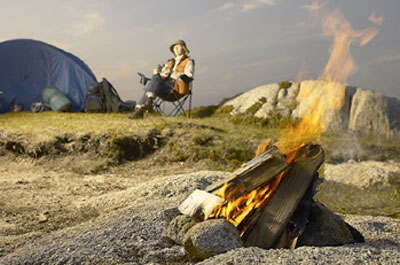(单词翻译:单击)
情景对话
Todd: So, now Terry when you finish your bicycle ride at the end of the day, you go to a campground, so what do you do, I mean, you set up camp, I mean, and how to you take a shower, or brush your teeth, or?
托德:泰瑞,在结束一天的自行车骑行后,你在露营地会做什么?我是问你把帐篷支好后,你要怎么洗澡刷牙?
Terry: Oh, in this, as an example on this trip, I was staying mostly in state park in Washington, Oregon, and California. Almost all of the state parks that I stayed in had showers, so of course they have restrooms and all your basic facilities, as far as that goes, and as far as what I did, what we do in camp, or what I do in camp is, I usually pick up a newspaper during the day and I usually carry a novel with me so, part of what I do in the afternoon is just to relax and read the paper, or read a book, and then also in the afternoon, I work on my bike if I need to, just try and get ready for the next day, or unwind from that day.
泰瑞:哦,以这次旅行为例,我大部分时间都待在华盛顿州、俄勒冈州和加利福尼亚州的国家公园。几乎我停留的所有国家公园都有淋浴间,所以里面有卫生间和所有基本设施,基本上我在帐篷里做的事是……白天的时候我会买份报纸,而且我旅行的时候会带本小说,所以下午我基本上就是放松、看报纸或看书,如果有必要的话我会检查一下自行车的状况,为第二天的行程做准备,基本上就是放松。
Todd: Ah, what time do you normally make dinner?
托德:你一般什么时间做晚饭?
Terry: Ah, it just depends on, usually 5 o'clock, 6 o'clock, something like that. I, when I'm on the road I tend to be the proverbial "early to bed, early to rise."
泰瑞:这要视情况而定,基本上是五六点左右。我在旅行的时候会遵照那句谚语:早睡早起。
Todd: Sure. Like what things do you cook? Cause you probably don't want to carry a lot of food. Like what would be a typical meal that you would have?
托德:好。那你一般做什么东西吃?因为你不会带很多食物。一般情况下你做什么吃?
Terry: Um, you're absolutely right. You don't really want to carry a lot of access food because you're carrying a lot of weight anyway's. My, when I'm on the road, my bike probably weighs 45 kilos, so it's, that's a fair amount of weight to push up over a mountain range. Um, cook pasta for dinner, so some soup or something fairly simple. In groups you tend to buy more elaborate food, buy salad material and what not.
泰瑞:嗯,你说的完全正确。在旅行时不可能带太多食物,因为这样会增加重量。我在旅行时,我的自行车有45公斤重,在登山的时候这已经是相当重的重量了。我晚上会做意大利面、汤等简单的食物。和团队一起旅行时可能会买像色拉材料这样精致的食物。
Todd: Now, what do you actually prefer, doing the bicycle trip alone, or in a group?
托德:你是喜欢独自骑自行车旅行,还是喜欢跟团队一起进行自行车旅行?
Terry: Well, they both have their good points. I think the main thing was just that, it just depends if you're interested in doing a trip when a trip is available. In this case, there was a trip that was available, going down the West Coast but it was in the month of September and I had to return to Japan and so, the timing just didn't work out out for me, and then I think lately, doing these trips solo has, is working out for me because I'm not training for the trips. Typically when you're going with a group, you have to be in shape when the trip starts so that you can keep up with the group, so this, this is working out for me, to do solo trips.
泰瑞:两种都有各自的优点。我认为最重要的是要取决于你是否对这趟旅行感兴趣。就像这次沿西海岸的自行车旅行,时间是在9月份,可是我要回日本,时间不合适,现在我认为,独自旅行对我来说是种锻炼,因为我并没有为旅行进行过训练。尤其是你在和团队一起旅行时,你必须要保持良好的状态,这样你才能跟上队伍,所以独自旅行对我来说是种锻炼。
Todd: Oh, so you prefer the solo?
托德:所以你更喜欢独自旅行?
Terry: Well, it kind of depends.
泰瑞:嗯,这要视情况而定。
Todd: OK. Well, thanks a lot. Thanks a lot for talking about your trips.
托德:好,非常谢谢你。谢谢你和我们谈论你的旅行。
Terry: Thanks I enjoyed it a lot.
泰瑞:谢谢,我很享受。

译文属可可原创,仅供学习交流使用,未经许可请勿转载
重点讲解
重点讲解:
1. work out
锻炼;健身;
eg. I like to go to the gym and work out.
我喜欢上健身房做运动。
eg. Mr White keeps fit by working out for half an hour every morning.
怀特先生每天早晨锻炼半个小时以保持健康。
2. in shape
(身体)状况良好;(事物)情况良好;
eg. Plenty of exercise will help you keep in shape.
充分的运动会帮助你保持健康。
eg. You'll never be in shape until you eat less and take more exercise.
只有少吃多锻炼才能健美。
3. keep up with
(与…)齐步前进;不落后(于…);
eg. He made an arduous effort to keep up with the rest of the class.
他努力跟上班上其他同学。
eg. They walked so fast that I could not keep up with them.
他们走得那么快,我没法跟上。


